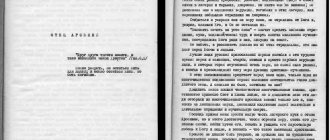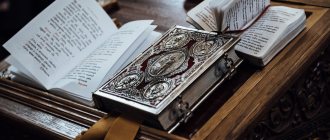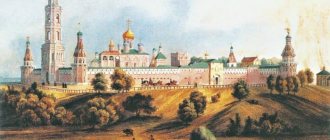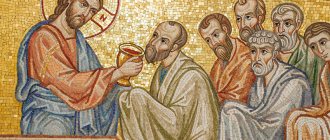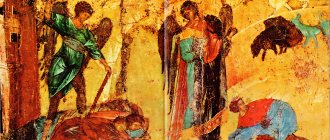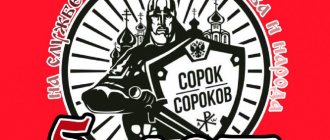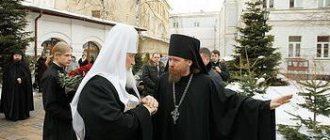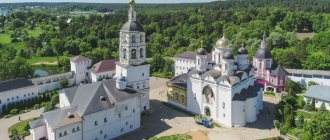The book “Father Arseny” can be considered a documentary and historical work, a biography of the hieromonk and priest Arseny. Since 1975, its publication and distribution has been underground. Only in 1993 it was published by the publishing house at the Orthodox St. Tikhon's Humanitarian University. Since then, six reprints have been published. The book has been translated into Greek and English and published in Greece, the USA, and France.
Authorship of the book
The book has no author. Each event is described by several people - all those who survived. However, none of them claims authorship.
The narrative fabric is woven from scraps of memorable events, letters, notes from spiritual children and all those hundreds of people whose lives were illuminated at least a little by the Orthodox elder.
The rector of St. Tikhon's University, Archpriest Vladimir Vorobyov, edited these records. Almost without subjecting them to literary editing, he left in them naturalness and liveliness, a feeling of authenticity and sincerity.
Who is Peter Streltsov
Pyotr Andreevich Streltsov is the secular name of hieromonk and priest Arseny, who was born in 1894 in Moscow. He graduated from high school at the age of 16, after which he entered the Imperial Moscow University. During his five years of study, Pyotr Streltsov did a lot of work on studying Russian architecture, wrote numerous studies and monographs on the history of ancient Russian art.
Biography
Streltsov Petr Andreevich is an art critic who has long become famous in scientific circles. In his youth, he experiences mental torment between worldly life and his childhood dream of monasticism.
Main stages:
- He fulfilled his dream at the beginning of 1917, when he went to Optina Pustyn. There he lived for two years in obedience to two elders - Anatoly and Nektarios.
- Having taken monastic vows as a hieromonk under the name Arseny, with the blessing of the elders, he goes “into the world.”
- Patriarch Tikhon approved the priestly path of Father Arseny and allowed him to serve in one of the parish churches of Moscow.
The rector of the church was Father Pavel.
Religion and faith in life
Religion and faith are inseparable from the life path of Peter Streltsov. At the end of 1921, Archpriest Pavel was arrested, and therefore, until December 1927, Father Arseny became the only rector of the temple. However, in December 1927, he was also arrested and sent to the Arkhangelsk region for two years. After exile, it was forbidden to return to Moscow, so until his second arrest in 1931, Arseny served in a church in the Moscow region.
Then his life develops as follows:
- He is exiled to the Vologda region for five years. Returning from exile, he continues to serve as a priest, but secretly (at home and in compliance with strict secrecy). During this time, my father manages to go to Petushki several times to meet with Bishop Afanasy Sakharov.
- In 1939, he was again arrested and exiled to Siberia. In 1940, the fourth arrest was exile to the Urals, where he had to endure a long stay in a maximum security camp without the right to correspondence.
- Having been released from the camp in the spring of 1958, Archpriest Arseny settled in the city of Rostov the Great. Until his death in 1975, he lived in the house of the widow of his spiritual son who died in the camp. In the same city, Father Arseny was buried.
A stone with the imprint “Father Arseny 1894-1975” was installed at the burial site. Now the burial place is lost because the stone itself has disappeared, and those who could show the grave of Father Arseny have already died. Currently, in the cemetery of the city of Rostov the Great there is a symbolic grave of the hieromonk.
Part one Camp
Camp
The darkness of the night and the severe frost froze everything except the wind. The wind carried snow charges, which, spinning, burst in the air, turning into clouds of fine prickly snow. Flying into obstacles, the wind threw shreds of snow, picked up new ones from the ground and again rushed somewhere forward.
Sometimes there would suddenly be a lull, and then in the darkness of the night a giant spot of light would appear on the ground. In the streaks of light lay a city spread out in the lowlands. Barracks, barracks and barracks covered the ground.
The towers with searchlights and sentries on them went beyond the horizon. Strings of barbed wire stretched between the posts formed several rows of barriers, between which lay stripes of blinding light from the searchlights.
Guard dogs wandered lazily between the first and last rows of barbed wire.
The beams of searchlights fell from some towers and rushed to the ground, slid along it, climbed onto the roofs of the barracks, fell to the ground again and again ran across the territory of the camp, surrounded by wire.
The beams of some searchlights searched the space outside the camp and, having run around a certain sector, returned to the rows of barbed wire, only to begin running again a few moments later.
Soldiers with machine guns, standing on towers, continuously scanned the space between the rows of wire barriers. The calm did not last long, the wind suddenly broke again, and everything again roared, hummed, howled, the prickly snow obscured the bright spot of light, and darkness covered the valley.
The special purpose camp was still sleeping, but suddenly there was a blow to the hanging rail, first one, at the entrance to the camp, and then the steel rails rang under the blows in different parts of the camp.
The spotlights on the towers darted frantically, the gates of the camp opened, and covered trucks with “educators”, guards, security workers and civilians began to enter the zone one after another.
The cars drove around the camp, stopped at the barracks, people jumped out of the trucks and four people at a time walked to the barracks, walked around it from all sides, checked the safety of the bars on the windows, the presence of locks on the doors, the absence of undermining of the walls or other signs indicating escape of prisoners .
Having examined and made sure that nothing was damaged, the guards unlocked the doors of the barracks, and at this time the searchlights continued to rush even more frantically, and the sentries carefully looked around the camp from the towers. The dogs between the rows of wire began to nervously run around their area.
The special purpose camp began its working day. Thousands, tens of thousands of prisoners began to work.
The darkness slowly brightened, a gray northern winter dawn set in, but the wind still tore the snow, threw it into the air, howled and hummed, meeting the slightest obstacle, and carried the hard, prickly snow further and further.
Outside the camp, not far from it, several fires were burning, the flames of which flared up and then died out.
The fires burned continuously day and night, warming the frozen ground for the mass graves in which the dead prisoners were buried. The camp sent hundreds and dozens of its residents there every day, paying tribute to the established camp regime.
Barack
The “special regime” camp came to life. The doors of the barracks slammed, the prisoners ran out into the street for verification, and lined up. There were screams, swearing, and someone was beaten.
Cold, piercing wind and darkness immediately enveloped the prisoners. Forming brigades in columns, they went to the distribution of “rations” and from there to the place of work.
The barracks were empty, but the smells of rotten clothes, human sweat, feces, and carbolic acid filled it.
It seemed that the screams of the guards, the echoes of soul-shattering swearing, human suffering, the stench of criminality still remained in the empty barracks, and this made it feel disgustingly sad among the bare benches and the corridor of bunks. The warmth remaining in the barracks made it habitable and softened the feeling of emptiness.
Twenty-seven degrees of frost and gusty winds were scary today not only for the prisoners who had gone to work, but also for the warmly dressed guards who accompanied them.
Those who had left the barracks a few minutes ago went out into the street with fear; work awaited them, frightening everyone with the incomprehensibility of the requirements, senseless cruelty and insurmountable difficulties created by the camp authorities.
The work performed by the prisoners was necessary, but everything was done in such a way that the work became unbearable. Everything became difficult, painful and scary in the “special regime” camp; everything was done in order to slowly lead people to death. “Enemies of the people” and criminals were sent to the camp, whose crimes were punishable only by death - execution and were replaced by imprisonment in a “special” one, from which exit was almost impossible.
Father Arseny, formerly Pyotr Andreevich Streltsov, and now a “convict” - prisoner No. 18376 - came to this camp six months ago and during this time he realized, like everyone else living here, that he would never leave here.
The camp number – 18376 – was sewn on the back of his padded jacket, hat and sleeves, which made him look, like all prisoners, like an “advertising man”.
The night turned into a dark dawn and a short half-dark day, but now lanterns and searchlights still illuminated the camp.
Father Arseny was a permanent barracks “orderly”, he chopped firewood near the barracks and carried armfuls of it to the barracks stoves.
"God! Jesus Christ, Son of God! “Have mercy on me, a sinner,” he repeated continuously as he carried out his work.
The firewood was damp and frozen and did not split well. There was no ax or cleaver allowed in the “zone,” so he split the logs with a wooden wedge driven into the crack by another log.
The heavy and frozen log slid and bounced in Fr.’s weak hands. Arseny and could not hit the end of the wedge being driven in. Work went slowly.
Incredible fatigue, deep exhaustion, and the grueling regime of camp life made it impossible to work—everything was hard and difficult. By the time the prisoners arrive, the huge barracks must be heated, swept and cleaned. If you don’t have time, the guard will send you to a punishment cell, and the prisoners will beat you.
In the camp they knew how to beat and beat mainly political ones. The authorities beat to instill fear, and the criminals beat “to take away the soul”; the accumulated hatred and cruelty came out. They beat someone every day, they beat them skillfully, with pleasure and joy. For criminals it was entertainment.
"God! Have mercy on me, a sinner. Help me. I trust in You, Lord and Mother of God. Don’t leave me, give me strength,” Fr. Arseny, exhausted from fatigue, carried armful after armful of firewood to the stoves.
It was time to heat up; the stoves had completely cooled down and did not provide any more heat. It was not easy to light the stoves: the wood was damp and there was little dry kindling. Yesterday Fr. Arseny collected dry wood chips and put them in a corner near one of the stoves, thinking: “I’ll put the dry wood for safekeeping, and tomorrow I’ll quickly light the firewood with them.” Today I went to get dry wood, and the criminal punks took it and poured water on me out of spite.
The time has come to light the stoves; if it’s too late, the barracks won’t warm up before the prisoners arrive. He rushed about. Arseny looks for birch bark or dry wood chips in the wood behind the barracks, and he himself says the Jesus Prayer: “Lord Jesus Christ, Son of God! Have mercy on me, a sinner,” and adds: “Thy will be done.”
I looked through the firewood behind the barracks and saw that there was no bark or dry wood, and you couldn’t figure out how to light the stoves.
Bye o. Arseny was sorting through firewood; an orderly came out of the next barracks, an old man, a criminal with large charges and exorbitant cruelty. They said that in the old days it thundered throughout all of Russia. He had so many things to do that he even began to forget.
He didn’t talk about his affairs, and for the little that the investigator found out, they gave him a “tower” - execution, and replaced him with “special”, which for old criminals was sometimes worse than a “tower”. He was shot and immediately died a painful, slow death. Those who accidentally left the “special” became completely disabled, therefore, when they got here, people became embittered, and this bitterness resulted in them beating political and their own criminals to death.
This criminal kept his entire barracks under strict strictures, and his superiors were even afraid of him. It happened that he blinked at the guys and there was an accident, and then conduct an investigation.
The old man's name was "Sery", he looked about sixty years old, and outwardly he seemed good-natured. He started talking to people kindly, with jokes, and ended with abuse, mockery, and beatings.
I saw that Fr. Arseny sorted through the wood several times and shouted: “What are you looking for, priest?” “I prepared the kindling in the evening, and they poured water on it for fun, so I walk around and look for dry wood. The firewood is damp, I can’t imagine what to do.”
“Yes, priest, without kindling you’re in trouble,” answered Gray. “People will freeze when they come home from work, that’s what’s bad, and they’ll beat me up,” said Fr. Arseny.
“Let's go, pop! I’ll give you kindling,” and led Fr. Arseny to his firewood, and there is a whole woodpile of dried wood.
Flashed by Fr. Arseny's thought: the joke was invented by Sery, he knew his character and did not expect help from him. “Take it, oh. Arseny, take as much as you need.”
Became o. Arseny is collecting dry wood and thinks: “I’ll pick it up, and he’ll start beating me for the amusement of others and shouting: “Pop thief!”, but he was immediately surprised that Gray called him “Father Arseny.” I read a prayer to myself, mentally made the sign of the cross and began to collect dry wood. “Take more, oh. Arseny! More!" Gray bent down and began to collect dried wood himself and carried an armful after Fr. Arseny to the barracks. They placed dried wood near the stoves, and Fr. Arseny bowed to Gray and said: “God save you.” Gray did not answer and left the barracks. Father Arseny laid out the kindling in the stoves in a rack, covered it with firewood, set it on fire, and the fire quickly engulfed the logs in the first stove; you just had time to throw the wood in, carry it to the stoves, clean the barracks, wipe the tables, and carry the firewood again and again.
The time was approaching three o'clock in the afternoon, the stoves were heating up, the barracks gradually became warmer, the smells became sharper as a result, but the warmth made the barracks feel close and cozy.
Several times the warden came into the barracks, and, as always, his first words were angry swearing and threats, and when he entered the barracks one time he saw a piece of wood on the floor and hit Fr. Arseny on the head, but not hard. Carrying firewood and constantly throwing it into the stove completely weakened Fr. Arseny, his head was noisy from weakness and fatigue, his heart was racing, he was short of breath, his legs were weak and it was difficult to support his thin and tired body. "God! God! Don’t leave me,” Fr. whispered. Arseny, bending under the weight of carried firewood.
Father Arseny
History of writing
One of the deep admirers and “spiritual children” of Father Arseny, Vladimir Vladimirovich Bykov, collected stories of victims of persecution against the church for many years, and personally knew many of the authors of memoirs about the holy father. He knew Elder Arseny and even confessed to him 12 times. Vladimir Bykov donated his manuscripts to the Orthodox St. Tikhon's University for the Humanities. They contain descriptions of the lives and trials of several real people.
At the same time, he had one condition - not to give real names and dates that could determine their identity. That is why different ascetics exist in the book under the same name of Hieromonk Arseny.
Almost 20 years ago, on the initiative of the university, data was collected on tens of thousands of people who suffered from persecution of the Orthodox Church. It was their editor and compiler of the book, Vladimir Vorobyov, who included them in the first edition. The recordings were left unedited to maintain maximum authenticity.
Idea and essence
Reader interest in the book “Father Arseny” is associated not only with the literary component. The religious perception of the world in the twentieth century was associated with the image of the new martyrs, because “Father Arseny” is a story about the survival of ascetics in the camps, about the exploits of faith, about the fate of the Church in the years 1920-1950.
The book blurs the line between documentary and fiction. Prose becomes a reliable witness to a terrible time. The multiplicity of prototypes is not important to the reader; only the uplifting spirit of the book is significant. This is hope for salvation, a monument to all the victims, tortured and killed.
Plot of the book
Each event in this book is the story of several people. Stories and confessions are placed on seven hundred pages, dozens of names and surnames are included.
It is important to note that:
- the plot itself can be tracked by the headings, which have a literary purpose;
- in each short story, the space of hell, terrible, tragic events, many opposing figures - everything is connected in an everyday setting;
- gradually the reader gets acquainted with the biography of the priest, learns about all his exiles, suffering in the camps, acquaintances with different people;
- each chapter is presented in the form of a testimony, memoir or message;
- contains important information about what is important for spiritual development and survival in unbearable circumstances.
The first chapters point to a dark and difficult period of life: “Camp”, “Barack”, “The Sick”, “The Major’s Call”, “The Fair Overseer”. But further from the chapter titles it becomes clear that circumstances are changing, the state of mind is improving. This is obvious if you read “Life Goes On,” “Joy,” “Everything Changes,” “Confession.”
Current characters
Conditions of the Soviet era forced us to hide and change the names of all characters and titles. The first character is the criminal Gray, who appears in the second chapter.
In the third chapter, the sick and dying Sazikov Ivan Aleksandrovich appears, as well as the ideological communist Avseenkov Alexander Pavlovich. For them, the elder read a prayer for recovery to Christ and the Most Holy Theotokos.
These characters act as memoirists in the next chapter. Gradually, the reader becomes acquainted with a dozen names and surnames: Ivan Karii, Vera Danilovna, Major Abrosimov Sergei Petrovich, Alexey (with whom Arseniy survived in a punishment cell in thirty-degree frost), Nadezhda Petrovna, doctor Boris Petrovich, monk Mikhail, Sergei Sergeevich.
Genre of the work (main features)
Literature of the second half of the 20th century increasingly strives for documentary and authenticity, when the author peeks through the external artistry and conducts a direct conversation with the reader. At the same time, he does not strive for personal authorship or introducing individuality into the text. The author's task is to describe eyewitness accounts.
Only the authenticity of the story is convincing. The religious themes and spirituality of the text come first.
Text structure
From the time the first edition went out of print in 1993 until the last reprint in 2014, the book became more and more voluminous and was supplemented with new chapters.
Please remember that:
- The first three parts (“Camp”, “Path” and “Children”) were published in samizdat in 1975 and passed from hand to hand among church families. The manuscript was admired: no one had previously written about the millions of believers who died and were tortured in camps and prisons.
- In 1998, the third edition was published with the added fourth part, “The Path to Faith.” The materials for it were collected by Vladimir Bykov.
- In the new, reissued and revised edition in 2014, the fifth part “Love Thy Neighbor” appears, the materials for which have not previously been published.
- The previously unpublished 16 chapters are based on the stories of Father Arseny’s spiritual children, fellow prisoners and his own memories. Here appear the names of real people who knew the preacher closely and communicated with him: Bishop Afanasy (Sakharov), Archpriest Sergius (Orlov), Vsevolod Shpiller. They all secretly communicated with each other.
The book also includes photographs of ascetics who knew Hieromonk Arseny and experienced similar trials for their faith and Christ. The first and second parts have separate prefaces.
The prefaces to the first and fourth editions were written by the editor-compiler Vladimir Solovyov. In them he writes about the feat of uncanonized ascetics and new martyrs, about the question of the prototype and its authenticity.
Similar works
In our time, similar books appear about the lives of saints, biographies of elders, and presentations of the exploits of the Orthodox faith in the modern era.
These are:
- “The Unknown World of Faith” (republished from 2002 to 2010). This is a collection book containing different stories, but all about the extraordinary facts of the life of ordinary Orthodox Christians and famous people who have found faith in God.
- The true story of the three Optina new martyrs, killed on Easter in 1993, is described in Nina Pavlova’s story “Red Easter”. She acted as a collector of memories of the hieromonks and the manuscripts left behind by them.
- The book “Servant of God” is a biography of the elder mitred archpriest Nikolai Guryanov. It talks about a 20th century pastor, an outstanding confessor who is known to the Orthodox world for his exploits, his humble bearing of the cross and his sincere love for God.
- The feats of faith, love, forgiveness and sacrifice of the ascetics of our time are collected in the book by Alexandra Nikiforova “The Living Tradition of the 20th Century.” It contains stories of witnesses about holy elders and Orthodox martyrs.
In 2011, a film was made about how memories, stories and letters of various people who knew and communicated with the Orthodox elder Arseny were collected.
Psychology / Self-developmentFather Arseny - Orthodox saint
“The only thing that can direct us to noble thoughts and actions is the example of great and morally pure individuals” Albert Einstein “Bear one another’s burdens and thus fulfill the law of Christ” (Tal. 6:2)
Love for God and its manifestation in the form of love for one’s neighbor was the basis of the life of this person. As a monk, he was given the name Arseny, which means “courageous.” His mentors knew who they were giving the name to.
In this article we will briefly introduce you to the path of spiritual comprehension of the wise Orthodox elder Father Arseny (in the world - Pyotr Andreevich Streltsov, famous art critic, years of life 1894-1975). To complete the perception of the personality of Fr. Arseny, we present the memories of his spiritual children and people who were lucky enough to come into contact with him in life.
Start
Peter was the third child in the family. His brother died at two years old, his sister at four, and his mother, a woman of high spirituality and morality, when he was born, made a promise to God to invest in him faith, truthfulness and love for people. She considered herself responsible to Him, for He had entrusted her with a human soul.
According to the memoirs of Fr. Arsenia: “I, like all other children, played, played pranks, frolicked, sometimes fought, but my inner self was completely imbued with faith... It was my mother who planted the seeds of faith in my soul, nurtured them, and I entered into life, standing on solid ground from which nothing could push me.”
The character qualities inherent in childhood help Peter to study brilliantly and graduate from a classical gymnasium ahead of schedule, with a gold medal, and later from a university, also ahead of schedule. In addition to his studies, he is interested in ancient Russian art. Over time, this interest intensifies and leads to a deep study of Orthodoxy. In 1916, a spiritual turning point occurred in his life. He spends more and more time in churches and is looking for a confessor who matches his inner world. One famous Moscow priest advises him to go to Optina Pustyn, which is very difficult to get under the guidance of elders, but he is accepted under the guidance of two elders at once: Fr. Nectaria and Fr. Anatolia. Spiritual improvement in a monastery is not easy...
According to the memoirs of Fr. Arseny: “The elder in the monastery is your father, mentor, leader in everything, you don’t have your own will, there is a complete renunciation of your vain self.” One should not think that relationships with others were cloudless in the monastery. Coming to the elder, crushed and oppressed, I wanted to tell everything, but he already knew, yes, he knew everything, and by the nature of your attitude towards what happened, he determined the level of your spiritual perfection or fall and taught you to perceive what happened with prayer as the will of the Lord.”
Spiritual improvement continued for two years in the Optina Hermitage, and in 1919, having received a new name, Hieromonk Arseny, with the blessing of the elders, began a new stage in his life - service in the world. Having received permission to serve in the Moscow parish church, after some time he sees differences in the spiritual life in the monastery and in the city church and acutely senses two directions - Optina and that which lives at that time in church parish churches, but leading to the same goal. To unite them into one and put into the souls of people love for God and love for their neighbor as for themselves - this is precisely what Hieromonk Arseny sees as his destiny. And the path he chooses is the path of a spiritual mentor. To implement this plan at that time, permission from the church hierarchs was required. By chance, a fateful meeting occurs with Bishop Hilarion, a close associate of His Holiness the Patriarch, and later with Patriarch Tikhon himself, from whom he receives a blessing to follow his chosen path.
After the blessing of the Patriarch, Hieromonk Arseny creates a spiritual community at the church, where he initially serves as the third priest. In the 20s of the twentieth century, the Soviet government began an active struggle against believers and the Church. The rector of the temple is arrested, and Fr. Arseny takes over the leadership of the temple. The broad outlook and versatility of his personality attract highly intelligent and educated people to the community, mainly intellectuals and university students, members of Christian student circles, and people from the so-called “former” people at that time. Everyone about. Arseny teaches the main values that he himself strives for - Love for God, which manifests itself in life as love for one’s neighbor.
Venerable Nektarios (Tikhonov), elder of Optina Hermitage (1853-1205. 1928)
From the memoirs: “...in the community there were nobles, rich industrialists, merchants, even princes from high society with ringing surnames known to the whole world, their children, but no one ever showed the superiority of their origin, everyone was equal and could stand out only by the degree of spirituality education, obedience, deepening in prayer, kindness and love.”
Since 1928 for Fr. A time of testing begins for Arseny and his spiritual community. Arrests of priests and parishioners, exiles, camps, mass closures of churches and complete uncertainty for everyone about the future are increasing in the country. At the end of December 1927, just before the Nativity of Christ, Fr. Arseny is arrested and deported to the Arkhangelsk region. After the end of his exile, he settled a hundred kilometers from Moscow in a small town and occasionally served in the surviving church. This gives spiritual children the opportunity to come to him, but everyone has the feeling that this is temporary: repression is increasing, the efforts of the authorities are aimed at destroying the Church, the complete extermination of the clergy, the desecration and destruction of churches.
In 1931 - again arrested and a second exile, this time to the Vologda region. In 1939 - arrest and short-term exile to Siberia, the Urals and then a year-long exile to the Arkhangelsk region. At the end of 1940, Fr. Arseny was imprisoned in a “special” camp, which was called “mortal” - few people managed to survive in such conditions.
Camp
Even in conditions of cruelty and the proximity of death at any moment, the main thing for Fr. Arseny continues to be Love for God. Thanks to this, he not only survived in the camp, but managed to gain even greater spiritual strength, which he gave to help others, filling their lives with faith in God, kindness and peace.
From his memoirs: “He held on with one prayer. To those who knew him, it seemed at times that he lived not in a camp, but somewhere far, far away, in some special, bright world known only to him. It used to be that he was working, his lips silently whispering the words of prayer, the Holy Names, and suddenly he would smile joyfully and somehow in a special way and become somehow illuminated, and it was felt that strength and vigor would immediately increase in him. But this inner deepening of his state never prevented him from seeing the difficulties of the people around him and striving to help them.”
Believers, communicating with him, saw that the soul of Fr. Arsenia seemed to be eternally at prayer service in the temple of God, forever striving to dissolve in the desire to do good.
By helping a person, Fr. Arseny did not think about who this man was and how he would react to his help. At first the prisoners thought that he was ingratiating himself, waiting for gratitude, then they began to call him “blessed”, but gradually the majority began to understand him. The attitude towards Fr. has changed. Arseny in the barracks. The intelligentsia saw in him a scientist who combined faith and knowledge. Former communists according to the behavior of Fr. Arseny began to view faith and the believer differently, and to many of them the believer no longer seemed like an “obscurantist.”
Believers saw in him a priest or an elder who had achieved spiritual perfection. Many found peace and, to some extent, reconciled with life in the camp, observing the life of Fr. Arsenia.
The criminals defended Fr. Arseny and treated him with respect - in their own way, resorted to his spiritual help. He did not avoid or shun them like other prisoners. The most important thing is Fr. Arseny was not afraid of anyone.
Following his duty, humility before the Higher Will and at the same time fearlessness endowed Fr. Arseny had a special inner strength that everyone around him felt. There was a feeling that God himself was protecting him and subordinating the space to his will. This was especially evident in critical situations, when the qualities of Fr.’s character were most clearly manifested. Arsenia.
Calm
People came to the barracks with the next stage, so hungry and exhausted that they all decided that only a few would survive until the morning. O. Arseny could not allow this and, approaching those on whom what was happening in the barracks largely depended - “seriously”, calmly said that they needed to feed the arrivals and put them to sleep on the sunbeds that were located near the stoves.
Venerable Anatoly (Potapov), elder of the Optina Hermitage (15.02.1855 - 12.08.1922)
Not everyone agreed with this. But the words he said quietly and calmly: “Let’s hurry up,” had an effect. The “serious” ones silently stood up and went to shift people, the first to take out and put on the table what they had from food. As a result, people were saved. Eyewitnesses were struck by the concentration and calmness of Fr. Arseny, when he said this, he said to people who, it seemed, had nothing on their minds, but began to carry out as if they had received an order.
Faith
One day, standing up for a young boy who had arrived, he knocked the knife out of the hands of the criminal Karego and simply pushed him away. Karii fell and severely smashed his face on the nightstand. They regarded this as a sign of courage and did not touch Fr. Arsenia. However, the angry criminal reported to the camp authorities that there had been an alleged fight between Fr. Arseny and the rescued. The punishment for both was equal to death - imprisonment in a thirty-degree frost in a punishment cell lined with bare iron. Two days have passed - oh. Arseny and Alexey, that was the name of the rescued man, were alive and not just alive - their bodies were warm, which seemed incredible. Alexey witnessed a miracle: staying all this time in some other dimension thanks to the fervent prayer of Fr. Arseny, he was saved along with his future spiritual father. Father Arseny became a “guiding star” for Alexei, an example in life, and when his time in the camp ended, he dedicated his life to God, becoming an Orthodox priest.
Fearlessness
When escorted from one camp to another, Fr. Arseny was not afraid to break ranks under the risk of being shot on the spot and help get up an exhausted and freezing prisoner who had fallen and could no longer walk. Struck by such a person’s attitude towards his own life, the guards not only did not shoot Fr. Arseny, but showed their participation in saving the freezing man. They took alcohol from the flask and poured it inside the prisoner who was losing his last strength, which brought him back to life.
Compassion
The repeat offender Gray, whom the whole barrack feared, became mortally ill and became embittered at the world due to severe pain and imminent death. Father Arseny began to look after him, showing deep compassion for his soul, and to pray for him. Gray initially suspected Fr. Arseny had selfish motives, but soon saw his true intentions to alleviate his suffering. The inner light and kindness emanating from Fr. Arseny, little by little filled Gray’s soul, dissolving cruelty and anger. He felt the pain leaving his body when Fr. Arseny is nearby. Gray, who did not believe in God all his adult life, changed and before his death he asked Fr. Arseny absolution.
In the surrounding dull and depressing reality, Fr. Arseny sought to bring peace to the lives of everyone he met and alleviate suffering. In any situation, seeing God behind everything that happened, he helped his neighbor with prayer for him and specific deeds, often requiring self-sacrifice. Giving up his own needs for the good and salvation of his neighbor, no matter who he was, giving his last, he did not expect gratitude in return.
Even the guards and camp authorities felt his spiritual strength, inner peace and selflessness. For 18 long years he was in a “special” ward. Arseny. People who lived in such an environment for more than 2-3 years were already considered “long-livers.”
Several times during his imprisonment he was taken out to be shot, which seemed inevitable, but he was always returned to the barracks at the last minute for various reasons. Apparently, God kept it for future affairs. A lot of time passed before changes occurred in the country that made it possible to free people who suffered for their faith.
Elder
In 1958, after being released from the camp, Fr. Arseny settled in Rostov the Great in the Yaroslavl region. For the first months he lived in solitude, but soon he sent several letters to his spiritual children, with whom he had not had contact for 18 years, and none of them knew whether Fr. Arseny. After this, the spiritual family began to gather again. Old and new spiritual children from all over the Soviet Union came to Rostov, everyone who so needed his spiritual experience. These were completely different people - both in social status and age.
From the memoirs: “Whoever you met in the house where he lived: a gray-haired academician, a retired general, a corresponding member, a collective farmer, doctors of medicine or other sciences, a worker, a famous psychiatrist, a former party worker, thieves in law who broke with the underworld under the influence of Fr. Arseny, and even law enforcement and intelligence workers who were previously in the camps, but have now been restored to their rights and have become believers. Sometimes the ruling rulers, dressed in civilian clothes, suddenly arrived for one day, and the rulers who were in retirement lived for weeks.”
Optina, desert. 19th century
According to the calculations of his spiritual children, every year to Fr. About 350-380 people came to Arseny.
His life was filled daily with service for the benefit of others. Fr. got up. Arseny at 6 am, went to bed at 12 am. Every day he performed divine services, confessed and talked with those who came. The differences between big and small deeds, sins, thoughts with which they came to him, Fr. Arseny didn’t do anything, he listened carefully to everything and gave advice. Helping people in any form was the basis of his life. At the first call, he went anywhere to help, giving everything he had. Wherever he rode or walked, he always prayed.
He became for everyone an elder, as if living in a monastery, to whom they came to receive advice, instruction, lay down the burden of sins that burdened the soul, be cleansed, and then return to the world and gradually spend the grace they received, then come again for cleansing.
From the memoirs: “With a simple spoken word, he immediately made it clear that he had already understood the person who had come, understood why he had come, penetrated into his spiritual world, knew the worries, troubles and spiritual confusion that gripped him. The newcomer instantly became close to him, without hesitation or fear revealing his innermost sinful secret. The word was combined with heartfelt prayer to God and love for the one who came.”
He strove to be informed in various spheres of life, because he believed that his answers to questions from students, workers, and professors should be understandable to them, and the words “faith” and “God” should not sound like an anachronism or a half-answer to them.
Many were surprised by the phenomenal memory of Fr. Arsenia. It happened that a person confessed to him ten or fifteen years ago and, of course, completely forgot what he said then, but Fr. Arseny suddenly remembered a large passage from that confession. This both frightened and surprised the confessor.
Empty talk, “washing bones”, condemnation of any person and especially clergy Fr. Arseny could not tolerate ill will, gossip and quarrels between his spiritual children, he tried to reconcile them and find out the cause of the conflict.
Everyone who met Fr. Arseny, inevitably noticed his special insight. He himself did not like it when they talked about it, and considered this ability acquired through his spiritual communication. He generally did not like it when people talked about his merits, but what really brought him joy was hearing how others came to God.
Thanks to his prayers, miraculous healings of seriously ill patients took place, for whom medicine could no longer help. Sometimes, in order to be saved, it was necessary to urgently leave for another city and pray at the patient’s bedside for several hours in a row, several times a day, and sometimes for several days. But he always forgot about himself when his help was needed, and it was needed constantly.
About instructions
What was he talking about? Arseny with the people who turned to him for help and advice? First of all, about the need to renounce one’s own self, about forgiveness, about love for God and serving one’s neighbor. But the main thing is that he spoke, measuring a person’s ability to hear him, penetrating into his true essence. He spoke to the human soul. O. Arseny was not verbose, he tried to convey his thoughts in a concise but clearly outlined form. No matter what or with whom he spoke, he was friendly, the person always felt the inner kindness and warmth of the words spoken.
From memories
“Be with people, help them, no matter who they are - colleagues, acquaintances, relatives - help everyone, and those around you will understand what a Christian is and will come to the Church, to God.”
“Why is it difficult for you all? Each sees only himself and does not for one moment want to take the position of another.”
“He entered my inner self, my spiritual world and read the layers that had accumulated in me over many years. I listened and saw myself, saw the abyss of mistakes made, uncorrected and permeating my entire being. He spoke about people with whom there was no mutual understanding, named their names, showed their view of the current situation, spoke on behalf of these people, as if knowing them...
If I, a psychiatrist, knew the psyche and spiritual world of the patient like Fr. Arseny, I think most of my patients would have recovered long ago. But to become a person like Fr. Arseny, we need constant prayer directed towards God and all-consuming love - the combination of these two principles creates an ascetic, a man of prayer, an elder.” This last memory gives an idea of how deeply Fr. could understand the inner world of a person. Arseny and heal the soul by showing him yourself.
Even at a time when he himself was seriously ill and had very little time to live, despite the numerous concerns of those around him, Fr. Arseny did not think about himself, but followed his chosen path: he prayed for others, confessed, and instructed. He helped people exactly as it is said in the Gospel, bearing human burdens, fulfilling the Law of Christ.
This is how the wise Orthodox elder Fr. remained in people’s memories. Arseny is in service to God, giving his life for the good of others.
This article was written thanks to the memories of spiritual children Fr. Arsenia. Subsequently, on the basis of these memories, a book was published about this great personality and soul - “Father Arseny”, which we recommend that you read.
Ilya Lisin During the preparation, materials were used from the book “Father Arseny”, publishing house of the Orthodox St. Tikhon's Humanitarian University, 2009; LLC Publishing House "Father's House", 2009.
